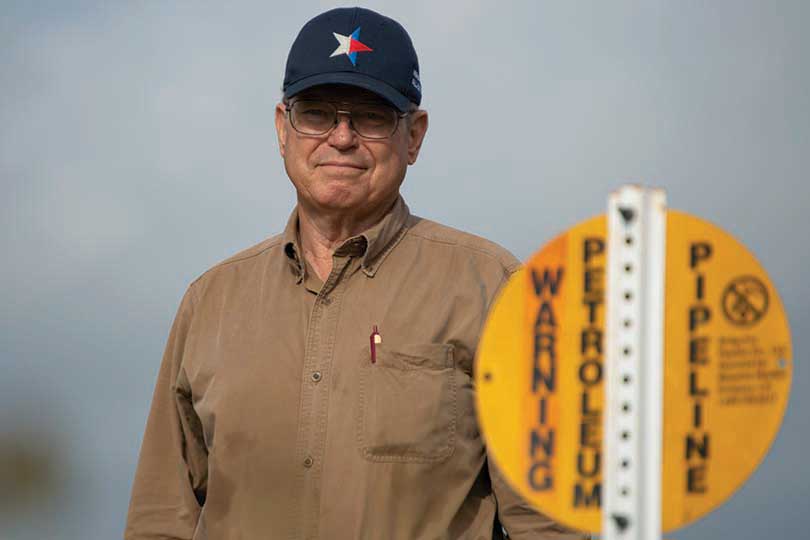By Julie Tomascik
Editor
Neil Walter stands on his Coryell County ranch looking out over the rolling hills. The grass blows in the wind, and his cattle graze contently. But warning signs serve as a reminder of how things changed in 2013.
It’s a day he won’t soon forget—the day a petroleum pipeline representative darkened the gate of his family’s ranch.
“I was approached by a pipeline company to put a petroleum pipeline across my land,” Walter said. “It was the line coming from the Permian Basin down to the coast.”
The first easement offer he received, regardless of the financial offer, was in favor of the pipeline company.
“There were no landowner protections at all in the easement language. It took me aback,” said Walter, who also serves as the District 8 Texas Farm Bureau state director.
He didn’t take the initial offer and started asking for specific landowner protections.
Negotiations began.
The representative brought back a second offer. This time, there were two landowner protections included.
“That was sort of insulting,” Walter said.
So, he changed his approach. He met with the representative and outlined the language he wanted included. A construction timeline, protocol for gates and locks and clarity on what would happen if the pipeline were abandoned in the future were some of his requests.
His list went on, and all requests were eventually met.
But why was it so difficult to get that language included? It was a question Walter had for the pipeline company.
Walter said they told him, “It’s the responsibility of the landowner to ask for that language.”
He was grateful they were willing to make those concessions, but it left him feeling like his needs weren’t a priority. He learned the company wasn’t really concerned about protecting his interests.
“It made me feel used, I guess you’d say. Sort of like a secondary partner,” Walter said.
And the first compensation offer he received was low.
“The first offer was a lowball offer. It wasn’t the best,” Walter said. “I negotiated up a little bit. But the price wasn’t the problem. The language of the easement was the problem.”
This experience proved valuable.
Walter took what he learned and applied it to the second pipeline company that approached him in 2017. They want to put another pipeline adjacent to the one already running through his land.
Different company. Same situation.
The second company offered a few more landowner protections upfront, but Walter still had to negotiate for fair and transparent language.
Construction has started, and those pipelines will be running through family land—land that Walter has been proud to care for.
“Some of this land has been in the family since 1855. For us, and other farmers, land is not a commodity to buy and sell,” he said. “It’s our way of life. I also raise corn, cotton and hay. I like to do it. That’s what I love to do.”
Walter understands eminent domain is needed, especially in a rapidly growing state like Texas.
“We need roads, pipelines, electrical lines and railroads. We need all that. But let’s be sensible about it,” he said. “Let’s protect the people who are affected by eminent domain. And let’s realize that we’re going through people’s livelihoods and their homes.”

